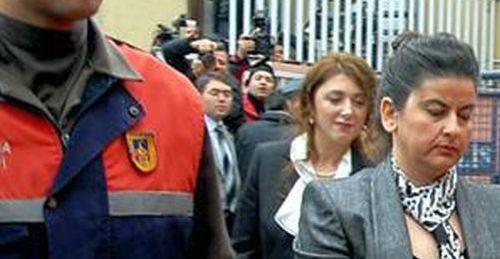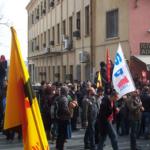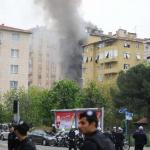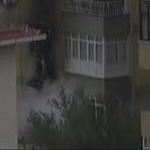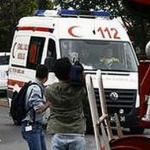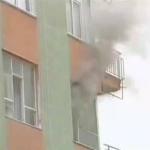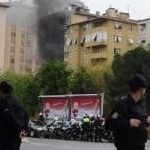After the first hearing of the "Revolutionary Headquarters" case on 23 February, ten defendants were released pending trial: journalist Aylin Duruoğlu, electrical engineer Mehmet Yeşiltepe, fishery engineer Ceren Sütlaş, ship operator Selim Öztürk, lawyer Nail Arıkan, news editor Abdülselam Sultan, cameraman Muhammet Çetin, cinema and TV productions supervisor Melek Seven, courier İbrahim Şimşek and advertisement editor Metin Akdemir. The defendants had been in detention for ten months.
The organization which calls itself "Revolutionary Headquarters" assumed responsibility for an explosion at the Istanbul building of ruling Justice and Development Party (AKP) on 1 December 2008 which left ten people injured. In the course of a police operation against the terror organization carried out on 27 April 2009, a police officer, a bystander and alleged terrorist Orhan Yılmazkaya, member of the Revolutionary Headquarters Organisation, were killed. Following the operation, 17 people were arrested on the grounds of supposed connections to the organization, among them journalists Aylin Duruoğlu and Mehmet Yeşiltepe.
Duruoğlu, the site manager of the Vatan newspaper's website gazetevatan.com, said at the hearing, "Instead of being taken into custody, I would have expected to be warned by the police. I have been deprived of my rights as a citizen."
"Nothing to do with you"
Of the 17 defendants, 13 say that they first heard the name of the organisation on the day of the shooting of Yılmazkaya and after they were taken into custody. When the police questioned Duruoğlu and Seven, they said, "This has nothing to do with you anyway." When they were arrested, the police said, "Sometimes the wet burns with the dry," implying that innocent people had been caught up in the investigation.
Criticism of indictment and long detention
At the hearing, the focus was on the state's responsibility to protect its citizens, as well as the rights that people should have when taken into custody and afterwards. Criticism of the indictment was voiced because it made legally unacceptable references to people's private lives or life styles.
In order to convince the judges to release their clients, lawyers were forced to emphasise the "apolitical stance" of the defendants. Even those released after ten months have, after all, already spent a long time in prison for allegedly supporting the illegal organisation.
Duruoğlu: "On trial for having lunch"
Aylin Duruoğlu began her statement by saying: "Why am I here? I am straining my mind." She added, "I am accused because I had lunch with a person whom I did not know to be a member of this organisation." Referring to the fact that she and Yılmazkaya knew each other from their university days, the journalist asked the judges: "If you had lunch with a fellow law graduate in Beşiktaş and were put on trial, what would you do? How far would you be implicated? But I have been implicated."
Duruoğlu also referred to a photograph of herself with a bundle of money, which has led to some newspapers speculating about illegally acquired wealth. She said, "It was a picture taking for fun. The money belonged to my friend. On the day I was taken into custody, the photo was taken from my mobile phone and given to the media. It was published, but neither the police nor the prosecution asked me about it."
Akdemir: "This has devastated my life"
When defendant Metin Akdemir spoke, other defendants, as well as some lawyers, could not hold back their tears. He said, "I have been under arrest for 300 days, accused of being a member of an organisation which I first heard of after my detention. I knew Yılmazkaya indirectly. I have never seen a real gun. I have no interest in politics. I wake up looking at bars every day. [...] My arrest has devastated my life."
Arıkan: I advised him on his book
Lawyer Nail Arıkan, also a defendant, said that he had become implicated after meeting Yılmazkaya, whom he knew from their university days, after the latter had come to him for legal advice about the copyright of his book "Turkish Food" and other issues. They met two times. Arıkan's fingerprints were found on a poetry book in the flat in Bostancı. He says that he had picked it up to have a look at it when he had gone to Yılmazkaya's office.
Help for a university friend has ended with detention
Captain Necdet Öztürk, who had rented the flat that Yılmazkaya was found in for himself and his fiancee Melek Seven, said that they had permitted Yılmazkaya to stay there because he had financial problems. "If I had known that he had illegal connections, I would certainly not have allowed him to stay," he added.
He added that he had come back from work abroad to make a statement, despite knowing that he would be arrested.
His fiancee Seven said, "Yılmazkaya was Necdet's first wife's friend, which is why I would not have been close to him."
Sevim Öztürk stated that Yılmazkaya, a university friend, had told her that he was unemployed and had asked if he could stay and that she let him stay in the apartment block where she and her former husband lived.
"As the daughter of a police officer, I shared everything I knew with the police. How could I have known that Yılmazkaya was a terrorist? I now understand that Yılmazkaya did not treat us as humans, but what I don't understand is why the state does not do so either."
Sütlaş: "How could I have known?"
Ceren Sütlaş, who allowed Yılmazkaya to have someone send money to him via her account, said, "It was me who told the police everything about Yılmazkaya. I wanted to help. I never went to the flat in Bostancı, I don't even know where it is. Yılmazkaya was a mild-mannered and compassionate person who liked cooking. I was not suspicious, how could I have known?" (EÖ/AG)





